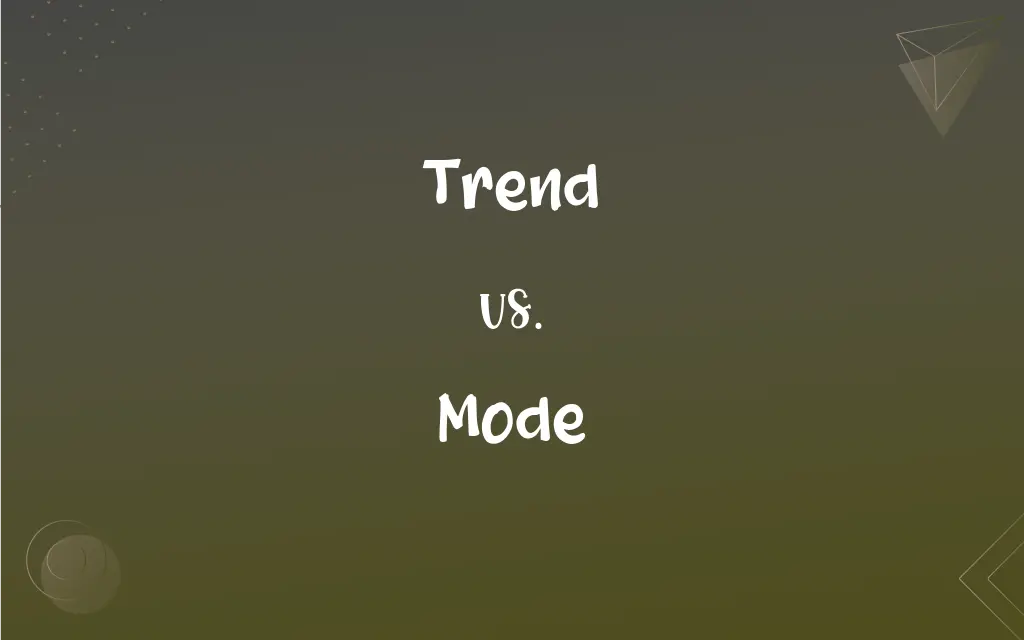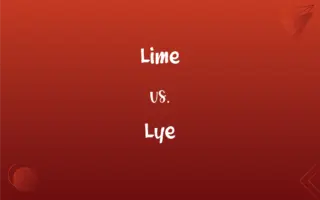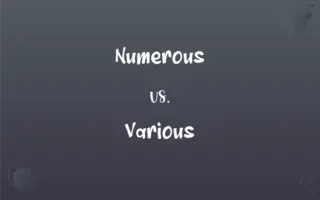Trend vs. Mode: What's the Difference?
Edited by Aimie Carlson || By Janet White || Updated on October 18, 2023
A "trend" denotes a general direction or pattern over time, while "mode" refers to the most frequently occurring value in a data set or a manner of operation.

Key Differences
The term trend commonly describes a prevailing inclination or course in society, economics, fashion, or other fields. It captures the general drift or orientation of events, thoughts, styles, or behaviors over a certain period. For example, one might observe a trend in fashion as certain clothing styles become popular. On the contrary, mode, when used in a statistical context, defines the value that appears most frequently in a given set of data. Hence, in a list of numbers, the mode would be the number that is repeated most often.
Trend can also represent a shift in public opinion or cultural phenomena. Trends often emerge as new norms or patterns that a significant number of people adopt. For instance, the rise of social media usage is a trend that has been observed over the past decade. Mode, in a different light, can also refer to a specific way or method of doing something. In technology, for example, a device might operate in different modes depending on the user's selection.
In market analysis or research, a trend can indicate an upward or downward movement in data points over time. This could pertain to sales, stock prices, or any other metric that changes over time. However, in the same realm of research, the mode would provide the value that is most commonly observed among the collected data, not showing the direction of change but rather the dominant value.
Socially speaking, trends often define what is currently "in" or popular within a community or globally. From dietary choices to music preferences, trends capture the prevailing winds of societal choices. Meanwhile, mode can also imply a prevailing manner or custom in a particular society but without the connotation of a changing pattern over time.
Summarizing, while both trend and mode can depict prevailing patterns or values in different contexts, a trend emphasizes the evolution or change in patterns over time, and mode underscores the most frequently observed value or a specific manner of operation.
ADVERTISEMENT
Comparison Chart
Definition
A general direction or pattern
The most frequently occurring value or a manner of operation
Usage Context
Fashion, economics, society, market analysis
Statistics, technology, mannerisms
Temporal Connotation
Often indicates changes or movements over time
Doesn't inherently indicate change over time
Examples
Trend towards online shopping, rising trend in temperatures
Mode of a data set, device in airplane mode
Nature
Descriptive, indicating prevailing inclinations or shifts
Precise, indicating dominant value or specific method
ADVERTISEMENT
Trend and Mode Definitions
Trend
A topic that is the subject of many posts on social media.
The hashtag became a trending topic overnight.
Mode
A manner of operation or function.
The device is currently in sleep mode.
Trend
A general course followed by data or events.
There's an upward trend in sales this quarter.
Mode
A particular form, variety, or mannerism.
He switched to a more aggressive mode of communication.
Trend
A tendency or inclination of a particular kind.
He set a new trend in the music industry.
Mode
A prevailing custom or style.
Modes of the 18th-century society were quite distinct.
Trend
A general tendency or course of events
A warming trend.
Mode
A manner, way, or method of doing something, experiencing something, or acting
Modern modes of travel.
Modes of consciousness.
Modes of affection.
Trend
Current style; vogue
The latest trend in fashion.
Mode
A particular form or kind
The building has multiple modes of egress.
Trend
The general direction of something
The river's southern trend.
Mode
A given condition of functioning; a status or operation
The spacecraft was in its recovery mode.
Trend
To show a general tendency; tend
The magazine's circulation is trending downward.
Mode
The current or customary fashion or style
A hat in the latest mode.
Trend
To undergo a rapid increase in public interest or attention
News of the earthquake is trending on social media.
Mode
Any of certain fixed arrangements of the diatonic tones of an octave, as the major and minor scales of Western music.
Trend
To extend, incline, or veer in a specified direction
The prevailing wind trends northeast.
Mode
A patterned arrangement, as the one characteristic of the music of classical Greece or the medieval Christian Church.
Trend
An inclination in a particular direction.
The trend of a coastline
The upward trend of stock-market prices
Mode
(Philosophy) The particular appearance, form, or manner in which an underlying substance, or a permanent aspect or attribute of it, is manifested.
Trend
A tendency.
There is a trend, these days, for people in films not to smoke.
Mode
See modality.
Trend
A fad or fashion style.
Miniskirts were one of the biggest trends of the 1960s.
Mode
The arrangement or order of the propositions in a syllogism according to both quality and quantity.
Trend
(mathematics) A line drawn on a graph that approximates the trend of a number of disparate points.
Mode
(Statistics) The value or item occurring most frequently in a series of observations or statistical data.
Trend
(nautical) The lower end of the shank of an anchor, being the same distance on the shank from the throat that the arm measures from the throat to the bill.
Mode
(Mathematics) The number or range of numbers in a set that occurs the most frequently.
Trend
(nautical) The angle made by the line of a vessel's keel and the direction of the anchor cable, when she is swinging at anchor.
Mode
(Geology) The mineral composition of an igneous rock expressed in terms of percentage of the total sample weight or volume.
Trend
Clean wool.
Mode
(Physics) Any of numerous patterns of wave motion or vibration.
Trend
(intransitive) To have a particular direction; to run; to stretch; to tend.
The shore of the sea trends to the southwest.
Mode
(Grammar) Mood.
Trend
(transitive) To cause to turn; to bend.
Mode
(music) One of several ancient Greek scales.
Trend
To be the subject of a trend; to be currently popular, relevant or interesting.
What topics have been trending on social networks this week?
Mode
(music) One of several common scales in modern Western music, one of which corresponds to the modern major scale and one to the natural minor scale.
Trend
To cleanse or clean (something, usually wool).
Mode
A particular means of accomplishing something.
What was the mode of entry?
Trend
To have a particular direction; to run; to stretch; to tend; as, the shore of the sea trends to the southwest.
Mode
A particular state of being, or frame of mind.
After a series of early setbacks, her political campaign is in crisis mode.
Trend
To cause to turn; to bend.
Not far beneath i' the valley as she trendsHer silver stream.
Mode
(statistics) The most frequently occurring value in a distribution
Trend
To cleanse, as wool.
Mode
A state of a system that is represented by an eigenfunction of that system.
Trend
Inclination in a particular direction; tendency; general direction; as, the trend of a coast.
Mode
(computing) One of various related sets of rules for processing data; more generally, any state of the system associated with certain behaviours.
In insert mode, characters typed are directly inserted into the buffer.
Trend
Clean wool.
Mode
(electronics) A series of settings on a device used for a specific purpose.
Airplane mode; night mode
Trend
A general direction in which something tends to move;
The shoreward tendency of the current
The trend of the stock market
Mode
(video games) A variation in gameplay, such as a difficulty level.
Trend
General line of orientation;
The river takes a southern course
The northeastern trend of the coast
Mode
(grammar) A verb form that depends on how its containing clause relates to the speaker’s or writer’s wish, intent, or assertion about reality.
Trend
A general tendency to change (as of opinion);
Not openly liberal but that is the trend of the book
A broad movement of the electorate to the right
Mode
(philosophy) That which exists only as a quality of substance.
Trend
The popular taste at a given time;
Leather is the latest vogue
He followed current trends
The 1920s had a style of their own
Mode
(textiles) In lace-making, a small decorative piece inserted into a pattern.
Trend
Turn sharply; change direction abruptly;
The car cut to the left at the intersection
The motorbike veered to the right
Mode
(textiles) The openwork between the solid parts of a pattern.
Trend
A general direction in which something is developing or changing.
The trend in urbanization is increasing globally.
Mode
(obsolete) A woman's mantle with a hood.
Trend
A prevailing fashion or style.
Bell-bottom jeans were a trend in the 1970s.
Mode
Style or fashion; popular trend.
Her wardrobe is always in mode.
Mode
Manner of doing or being; method; form; fashion; custom; way; style; as, the mode of speaking; the mode of dressing.
The duty of itself being resolved on, the mode of doing it may easily be found.
A table richly spread in regal mode.
Mode
Prevailing popular custom; fashion, especially in the phrase the mode.
The easy, apathetic graces of a man of the mode.
Mode
Variety; gradation; degree.
Mode
Any combination of qualities or relations, considered apart from the substance to which they belong, and treated as entities; more generally, condition, or state of being; manner or form of arrangement or manifestation; form, as opposed to matter.
Modes I call such complex ideas, which, however compounded, contain not in them the supposition of subsisting by themselves, but are considered as dependencies on, or affections of, substances.
Mode
The form in which the proposition connects the predicate and subject, whether by simple, contingent, or necessary assertion; the form of the syllogism, as determined by the quantity and quality of the constituent proposition; mood.
Mode
Same as Mood.
Mode
The scale as affected by the various positions in it of the minor intervals; as, the Dorian mode, the Ionic mode, etc., of ancient Greek music.
Mode
The value of the variable in a frequency distribution or probability distribution, at which the probability or frequency has a maximum. The maximum may be local or global. Distributions with only one such maximum are called unimodal; with two maxima, bimodal, and with more than two, multimodal.
Mode
How something is done or how it happens;
Her dignified manner
His rapid manner of talking
Their nomadic mode of existence
In the characteristic New York style
A lonely way of life
In an abrasive fashion
Mode
A particular functioning condition or arrangement;
Switched from keyboard to voice mode
Mode
A classification of propositions on the basis of whether they claim necessity or possibility or impossibility
Mode
Verb inflections that express how the action or state is conceived by the speaker
Mode
Any of various fixed orders of the various diatonic notes within an octave
Mode
The most frequent value of a random variable
Mode
The value that appears most frequently in a data set.
The mode of the data set {1, 2, 3, 3, 4} is 3.
Mode
A specific condition or state.
The software is in debug mode.
FAQs
Is there always a "mode" in a data set?
No, a data set might have no mode, one mode, or multiple modes.
How can one identify market trends?
Market trends can be identified through research, analysis, and observation of data over time.
Can there be multiple trends in a particular field?
Yes, a field can have various concurrent trends.
Can a trend be short-lived?
Yes, some trends can be fleeting, known as "fads."
Is "mode" always numerical?
No, "mode" can also refer to the most common category or type in non-numerical data.
How is "mode" different from "median"?
"Mode" is the most frequent value, while "median" is the middle value in a sorted data set.
What is the "mode" in statistics?
In statistics, "mode" is the most frequently occurring value in a data set.
What does "trend" typically signify?
"Trend" usually signifies a general direction or pattern over a period.
In which fields is "mode" commonly used?
"Mode" is commonly used in statistics, technology, and fashion.
Can "mode" refer to a manner of behavior?
Yes, "mode" can refer to a specific manner or custom.
Can trends predict the future?
Trends can indicate possible future patterns but aren't definitive predictions.
How does "airplane mode" relate to the definition of "mode"?
"Airplane mode" is a specific manner or setting of operation for devices.
Does "mode" always refer to frequency in statistics?
Primarily, but "mode" can also indicate the most common category in non-numerical data.
Can societal behaviors be a trend?
Yes, societal behaviors or norms can emerge as trends.
Can a device have multiple modes?
Yes, many devices offer various modes of operation or settings.
How are trends typically identified in research?
Through data analysis, observation, and studying patterns over time.
Does "mode" have applications outside of statistics?
Yes, "mode" can refer to ways of operation, customs, or styles outside of statistics.
Are trends always global?
No, trends can be local, regional, national, or global.
Are trends always popular?
Most trends gain popularity, but not all popular things are trends.
Do trends always indicate positive change?
No, trends can indicate either positive, negative, or neutral changes.
About Author
Written by
Janet WhiteJanet White has been an esteemed writer and blogger for Difference Wiki. Holding a Master's degree in Science and Medical Journalism from the prestigious Boston University, she has consistently demonstrated her expertise and passion for her field. When she's not immersed in her work, Janet relishes her time exercising, delving into a good book, and cherishing moments with friends and family.
Edited by
Aimie CarlsonAimie Carlson, holding a master's degree in English literature, is a fervent English language enthusiast. She lends her writing talents to Difference Wiki, a prominent website that specializes in comparisons, offering readers insightful analyses that both captivate and inform.































































